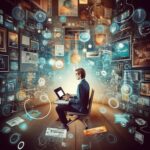— Artificial intelligence has been considered to be the next big thing in the world.
Globally, artificial intelligence holds great promise for a variety of businesses and industries. Whereas people and other animals exhibit natural intelligence, robots display artificial intelligence.
Artificial intelligence, or AI for short, is the intelligence exhibited by machines. It is a method by which a computer system can become more intelligent and be able to carry out intricate and challenging commands. Artificial intelligence has many applications and has been used in a wide range of sectors, including business, finance, employment, healthcare, education, and transportation, among many others.
Some have questioned what challenges the human species may face in the future in light of numerous technical developments and their consequences on civilizations over the years, including the creation of machines, robots, social media, and other technologically enabled successes.
It is clear that technology is not the only force changing civilization; there is a major social change occurring that will have an effect on how humans will live in the future. Having worked in the accounting field for a while, I have seen firsthand the impact technology has had on business and accounting. For example, technology can assist companies in identifying patterns of behavior that could point to fraud, which is vital information for auditing purposes.
For example, when it comes to hiring, managers can identify areas for improvement and weaknesses by utilizing AI to monitor worker performance and offer comments. AI can also be used to automate employee training and development programs, giving staff members access to up-to-date knowledge on industry trends and future technologies. Conversations with various HR specialists demonstrate how AI has drastically altered the hiring process. Thanks to AI-driven recruitment tools, firms can now find qualified candidates for available roles rapidly.
These systems use machine learning algorithms to scan resumes, assess qualifications, and give managers instant feedback, streamlining the hiring process.
Forbes attests to the importance of artificial intelligence (AI) in the educational system by claiming that it has the ability to fundamentally alter how people learn and are educated. This supports students’ study by responding to the issues and questions they come across in the course materials and online sessions. Teachers and students can now interact through a wider range of channels. AI can communicate directly with students and provide them with all the resources they need to learn remotely.
The AI-powered learning platform ALEKS provides personalized learning paths based on each student’s strengths and weaknesses. Through Carnegie Learning, students can access an AI-powered tutor that provides individualized teaching depending on performance, helping them to improve their math skills. Another program that lets people provide constructive feedback tailored to each student is called Smart Sparrow.
A few AI programs are already helping with education in places like classrooms. Examples such as Ahura, an AI-powered learning assistant, monitor attentiveness and engagement to track learning patterns. With its adaptable learning platform, Knewton offers students personalized learning experiences. An AI-powered tutor called Querium provides in-depth guidance on a range of topics.
The cost of developing and deploying AI-powered teaching solutions is one drawback, despite the fact that all of these may appear to be the ideal answers to current issues. This can be a big barrier for educators who need more money to invest in AI technologies.
Additionally, pupils who use AI-powered educational technologies lose out on social connection and emotional support from others. Parents worry about their child’s capacity to answer complicated math problems, but they are also worried about moral support, which artificial intelligence might not be able to provide.
AI can provide personalised learning and instant feedback, but it cannot take the place of human interaction.
Privacy concerns are another barrier to the use of AI in the classroom. The prospect that AI-powered educational systems will collect and retain sensitive personal data raises privacy and security concerns.
That being said, there is also the argument that AI can be used to lower the danger of privacy breaches by encrypting personal data, removing human error, and identifying potential cybersecurity events.
AI may also assist with a number of tasks associated with the healthcare system, such as financial management, image analysis, research studies, workflow simplification, and laboratory and clinical diagnostics.
According to the National Center for Biotechnology Information (NCIB), “The problem has gotten worse because there are no established criteria for the ethical application of AI in healthcare. Since its inception, ethical questions have been raised about artificial intelligence. Accountability, not the previously mentioned concerns about data security and privacy, is the primary issue. The existing system demands that when incorrect decisions are made, especially in the medical area, someone be held accountable due to the seriousness of the repercussions.
“Humans have always feared that artificial intelligence (AI) in healthcare might eliminate their jobs. Some people are sceptical about and even hostile to AI-based projects because of the threat of being replaced.”
Artificial intelligence has its drawbacks and concerns, despite being hailed for unlocking human potential and offering a means of leading a better, more fruitful life. Ovie Ogidiaka, a PhD candidate at the Nigeria Defense Academy in Kaduna and licensed accountant, said that “The future is Artificial Intelligence where robots will man the affairs of many companies. Though this will lead to efficiency and higher productivity, on the contrary, it will also lead to loss of job because of redundancy.”
Artificial intelligence is primarily driven by critical thinking and problem-solving skills, but it’s safe to say that it could be the next big thing in human history because, despite its complexity, AI can make recommendations and provide trustworthy insights. Humanity has always strived for better decision-making, and AI can help with that.
REFERENCES
Kandula, N. Role of Artificial Intelligence in Education, Vidya Jyothi Institute of Technology, Aziz Nagar, Hyderabad-75
National Center for Biotechnology Information (NCIB): Drawbacks of Artificial Intelligence and Their Potential Solutions in the Healthcare Sector
Unesco(2023) – Artificial intelligence: examples of ethical dilemmas
Technology magazine – Digital publication of tech stories
Wikipedia – the free encyclopedia



